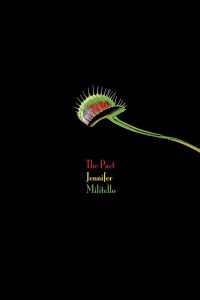 Review by Lisa C. Taylor
Review by Lisa C. Taylor
This stunner of a collection by the award-winning author of four previous poetry collections brings the reader into a conjured world of broken agreements, abuse, and mental illness, crafted with a deft and original lyricism. The opening poem, Agape Feast recalls the tradition of a Christian fellowship meal that pays homage to the meals Jesus shared with his disciples. Like much of this collection, the sacred and the familial are turned inside out and churned up until traditional beliefs and relationships reveal their dark underbellies. These Gods will not protect you. They are strangleholds that taunt the basic tenets of religion. “…Its Jesus is/the noose at your neck.” (5)
Most moving was the dissection of sibling and maternal relationships. The poem titles read like descriptions from the Diagnostic and Statistical Manual of Mental Disorders (DSM): Sibling Medusa, Sibling Invention, Sibling Bipolar.
I was ragged, sister. I was drugged.
I was alert for you. I understand
now the villain I am. Kithing had
a Satan to it. A suicide. A rust… (15)
Borrowing from religion, mythology, historical events, and traditions, Jennifer Militello has created a wholly unique use of language as cudgel, as balm, as venomous snake hiding in the underbrush by the side of a trail rimmed with wildflowers. To say that life represented in these poems has an edge is not enough. These poems are like a house with support beams that have failed, yet parts of the structure hold up and adapt to a perilous future.
In the poem, Homesickness is a Geographic Nostalgia, the poet turns the concept of home as a place of comfort upside down. There is a grief that has no respite, a feeling of being lost even in a place that should offer solace.
…If it is a beaker, I am the
experiment. If it is
the bubble, I am the reaction… If it is
the laboratory, I am ready to explode. (21)
The collection is a brink, a precipice. We, as readers, are dangling in this place looking for a modicum of comfort or consistency but neither are forthcoming. The theme of deceit and hypocrisy around every corner begins with the lies perpetrated by religion and family. In the poem, The Pledge, the speaker pledges to “let you electrify me/and jolt me dead…” (35) The world of the amoral dances with the wounded. The ending of the poem is both startling and gorgeous: “…I will not/martyr entrances for the exits they become.”
Every opening in the poems has a thistle or thorn next to the blossom. Not only is the language fresh and compelling, it invites as it shakes the reader into a place where complacency cannot dwell. This is raw and visceral stuff, the wound before it is neatly sutured, a beating heart waiting to be transplanted into an empty chest cavity. Like driving by a car accident, I found I could not look away. Many of the poems had a particular and lingering resonance.
Writing poems about family is a difficult undertaking, even if the family is used as metaphor for a greater discord in the world. My Mother is the Wasp Egg Attached to the Belly of the Tarantula touched me particularly. I have seen a tarantula hawk and heard the story of their particular brutality with victims. The idea of paralysis before an eventual devouring seems an apt metaphor for a toxic family. Children are helpless and have a limited range of experience in the world. In the atmosphere of The Pact, family members torture, lie, and belittle. In the title poem, the mother sees “…like a spider or fly, in every/direction…” (p. 50). In Dear Hiss, the mother hisses at the child for every minor infraction, including using the wrong fork.
Jennifer Militello’s ability to borrow myths, dark chapters in history like Jonestown, and harsh geography like Antarctica to bring us into the landscape of damage and resilience is a force.
My mother is a continent
at the bottom of the earth. No one
can live near her.
Men freeze for less. (58)
This collection is a crash landing. Coming through a pandemic year, and continued political unrest, it is easy to focus on collective crises, forgetting the suffering of the individual. These poems beckon as they sting. The best poetry does not avert its gaze, but carries the reader into the abyss, even momentarily. At some level, individual stories become both history and awakening.
Jennifer Militello is the author of four previous collections of poetry and one collection of non- fiction Her book, Body Thesaurus (Tupelo Press, 2013), was named one of the top books of 2013 by Best American Poetry and the collection, Flinch of Song was the winner of the Tupelo Press First Book Award. Her work appears in such journals as American Poetry Review, The Nation, The New Republic, The Paris Review, Ploughshares, POETRY, and Tin House, as well as in Best American Poetry, Best New Poets, and Poem-a-Day: 365 Poems for Every Occasion. She has been awarded the Barbara Bradley Award, the Yeats Poetry Prize, the Ruskin Art Club Poetry Award, the Betty Gabehart Prize, and the 49th Parallel Award, as well as grants and fellowships from the New Hampshire State Council on the Arts, the Barbara Deming Memorial Fund, Writers at Work, and the Millay Colony for the Arts.
The Pact by Jennifer Militello
Tupelo Press, 2021
$18.95 Paper ISBN 9 781946 482471
Lisa C. Taylor is the author of four collections of poetry and two collections of short fiction, most recently, Impossibly Small Spaces. She was awarded the Hugo House New Fiction Award. A new collection of poetry will be published in late 2021 or early 2022.
